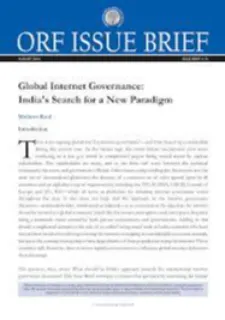There is an ongoing ‘global war’ for internet governance —and it has heated up considerably Tduring the current year. As the battles rage, the entire debate has become even more confusing as it has got mired in complicated jargon being tossed about by various stakeholders. The stakeholders are many, and so are their turf wars: between the technical community, the users, and government officials. Other issues compounding the discussions are: the wide net of decentralised platforms; the absence of a common set of rules agreed upon by all countries; and an alphabet soup of organisations, including the ITU, ICANN, OECD, Council of Europe and EU, IGF—which all serve as platforms for debating internet governance issues throughout the year. It also does not help that the approach to the internet governance discourse—multistakeholder, multilateral or bilateral—is as contested as the idea that the internet should be treated as a ‘global commons’, much like the oceans, atmosphere and outer space, despite it being a manmade entity owned by both private corporations and governments. Adding to this already complicated scenario is the role of so-called ‘swing states’ such as India, countries who have not yet been involved in either governing the internet or reaping its considerable economic rewards, but are in the coming years going to have large chunks of their populations using the internet. These countries will, therefore, have to invest significant resources to influence global internet debates to their advantage.
The question, thus, arises: What should be India’s approach towards the international internet governance discourse? This Issue Brief attempts to answer this question by examining the Indian government’s engagement with the global community, using the recently concluded NETmundial conference on internet governance as a case study. It also provides policy recommendations for the way forward.
By taking the lead and holding NETmundial, Brazil has become a prominent player in global internet governance. India, too, needs to introduce new and cutting-edge ideas to become a significant player. This could mean spearheading global conversations on, among other issues, the complex problems of cross-border jurisdiction and digital taxation. India could also help to deconstruct and redefine multistakeholderism to achieve international consensus. Another area where New Delhi can take the lead is in the privatisation of the global internet commons; for example, the management of ICANN or introduction of competition in critical internet infrastructure. The path has already been paved with the Indian Prime Minister announcing at the BRICS summit in Brazil that India should “take the lead in preserving cyberspace as a global common good”. India has, of course, been actively engaged in defining norms for responsible state behaviour in cyberspace at the meetings of the Group of Governmental Experts (GGE). These gains should be streamlined and further worked upon. However, this approach should go hand-in-hand with active engagement in internet governance platforms.
The views expressed above belong to the author(s). ORF research and analyses now available on Telegram! Click here to access our curated content — blogs, longforms and interviews.

 PDF Download
PDF Download



 PREV
PREV

